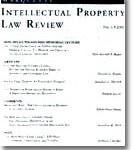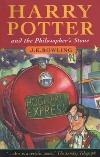The post-publication history of Edward Bellamy’s 1888 utopian novel Looking Backward, 2000-1887 speaks to the issue at the core of the Fallone-Boyden debate. My two colleagues disagree over the desirability of copyright protection for literary characters and the proper resolution of the recent legal action filed by J. D. Salinger against the Swedish author of a sequel to his novel, The Catcher in the Rye. Fallone opposes protection, and Boyden supports it. On this issue, I’m with Ed.
Looking Backward is the story of Julian West, a man who falls asleep in 1887 at a time of great industrial strife and who wakes up in the year 2000 when the problems of industrialism have been solved by a collectivist government that manages all industrial production for the benefit of society as a whole. At the time of the book’s publication, Bellamy was a 38-year old writer and one-time lawyer from western Massachusetts. Looking Backward quickly turned out to be one of the best-selling books written in the United States in the nineteenth century, selling several hundred thousand copies in the years immediately following its publication. It was translated into dozens of different languages and was also a publishing sensation in Europe.
The novel also prompted an international debate over both Bellamy’s vision of the future and his contemporary political views.
(Bellamy supported the Populist Party in 1890, and many so-called “Nationalist Clubs” were established to advance his ideas.) In addition, novels by other writers continuing the story of Julian West in the twenty-first century began to appear almost immediately.
At least six “sequels” were published in the United States in 1890 alone: John Bachelder, A. D. 2050: Electrical Development at Atlantis; Donald McMartin, A Leap into the Future, or How Things Will Be: A Romance of the Year 2000;Richard C. Michaelis, Looking Farther Forward; W. W. Saterlee, Looking Backward And What I Saw; C. H. Stone, One of Berrian’s Novels [Berrian is a novelist of the future in Looking Backward]; and Arthur Dudley Vinton, Looking Further Backward.
Some of these sequels — the ones by McMartin and Stone, for example — embraced Bellamy’s vision of the future and embellished the favorable depiction of life in socialistic 2000. The other sequels cited sought to paint Bellamy’s vision of the future as a dystopian nightmare.
Additional sequels by other writers were a fixture of the next two decades. Ludwig A. Geissler’s, Looking Beyond: A Sequel to “Looking Backward” by Edward Bellamy, and an Answer to “Looking Further Forward” by Richard Michaelis (1891) was a sequel to a sequel. In Geissler’s story, the unappealing aspects of Bellamy’s year 2000 reported in Michaelis’ book are revealed to be nothing more than occurrences in one of Julian West’s bad dreams. The collectivist future was in fact a utopia, and its shortcomings were only imagined. By the end of the novel, the technologically advanced Martians have decided to abandon their previous policy of ignoring the Earthlings because they now believe that they can learn lessons from their planetary neighbors.
Other Looking Backward sequels included Conrad Wilbrandt’s Mr. East’s Experiences in Mr. Bellamy’s World (1891, and published the previous year in German in Germany); J. W. Roberts, Looking Within: The Misleading Tendencies of “Looking Backward” Made Manifest (1893); Rabbi Solomon Schindler, Young West: A Sequel to Edward Bellamy’s Celebrated Novel “Looking Backward”(1894); an anonymously published British version, My Afterdream: A Sequel to the Late Mr. Edward Bellamy’s Looking Backward (1900); and Harry W. Hillman, Looking Forward: The Phenomenal Progress of Electricity in 1912 (1906), the latter a pro-Bellamy novel that reveals that mass electrification is the key to a peaceful, collectivist future. According to literary historian Krisham Kuman, at least sixty-two novels based on Looking Backward were published in the United States between 1888 and 1900.
All of the sequel writers made use of Looking Backward’s story line, and most employed Bellamy’s main characters: Julian West, the man from 1887, Dr. Leete, the twentieth-century scientist who awakens West and serves as his guide to the future, and Edith Leete, the doctor’s beautiful daughter with whom West falls in love (and who turns out to be the great-grand-daughter of the fiancé that he left back in 1887). As far as I can determine, none secured a license to do so from Bellamy.
Bellamy himself re-entered the fray in 1897 with his own sequel to Looking Backward, entitled Equality, in which he addressed many of the issues raised by the authors of the less than sympathetic sequels, including the future of education and women’s rights. Unfortunately, Bellamy’s own sequel was not nearly as successful as the previous volume, and he died of tuberculosis the next year at the age of 48.
Although the pace slowed in the twentieth century, there were almost one hundred Looking Backward sequels, prequels, and re-imaginings published after 1900, apparently culminating in the off-beat Edward Bellamy Writes Again, a 1997 novel by New Age Christian writer Joseph R. Myers who sought to combine the insights of Bellamy with those of the American psychic Edgar Casey. For a more detailed discussion of the history of Looking Backward and its sequels, one can consult Justin Nordstrom, “Looking Backward’s Utopian Sequels, Fictional Dialogues in Gilded Age American Thought,” Utopian Studies, Vol. 18 (2007) and Krishan Kuman, Utopia and Anti-Utopia in Modern Times (1997), and the works cited therein.
The copyright point here is that the ability to use Bellamy’s story line and characters made it possible to have a rich ongoing debate in the world of fiction over the merits of Bellamy’s vision of the future. Had Bellamy tried to control his characters Julian West and Edith Leete in the same manner that J. K. Rowling has controlled Harry Potter and Hermione Granger, or J. D. Salinger wishes to control Holden Caulfield, the intellectual life of late nineteenth- and early twentieth-century America would have been much less rich.
I’m not sure to what extent the Copyright Act of 1870 (in force when Looking Backward was published) protected literary characters. Even if it did provide protection, Bellamy would have been unlikely to have used it to suppress the publication of the many sequels to his work. As someone more interested in a better world than his own financial enrichment, he was no doubt delighted that his novel had inspired so many of his supporters and his critics to pick up their pens and continue his story. He certainly made no effort to prevent their publication.
Legal protection against verbatim copying of the text was enough for Edward Bellamy; I don’t see why it shouldn’t be enough for Miguel de Cervantes and J.D. Salinger as well.
 The thirteenth volume of the Marquette Intellectual Property Law Review (Summer Edition 2009) has recently been published and is now available. Our outgoing editor-in-chief, Melissa Benko and her excellent board have done an outstanding job once again.
The thirteenth volume of the Marquette Intellectual Property Law Review (Summer Edition 2009) has recently been published and is now available. Our outgoing editor-in-chief, Melissa Benko and her excellent board have done an outstanding job once again.
 I don’t mean to clog up our blog with a debate over copyright law, but
I don’t mean to clog up our blog with a debate over copyright law, but